[Dec 2007, Volume 4 Quarterly Issue] Pdf File size - The IIPM Think ...
[Dec 2007, Volume 4 Quarterly Issue] Pdf File size - The IIPM Think ...
[Dec 2007, Volume 4 Quarterly Issue] Pdf File size - The IIPM Think ...
Create successful ePaper yourself
Turn your PDF publications into a flip-book with our unique Google optimized e-Paper software.
MORE MARKETS, LESS GOVERNMENT<br />
mate contention of millions of marginalized<br />
citizens of the country – regarding<br />
their right to work, and<br />
particularly the right to avail of work<br />
of a suitable and gainful nature, in<br />
keeping with the directive of the constitution<br />
of India (Article 41; Directive<br />
Principles of State Policy) calling upon<br />
the State to make effective provisions,<br />
within the limits of its economic capacity<br />
and development, for securing<br />
the right to work. In a country where<br />
the rate of growth of the <strong>size</strong> of labour<br />
force exceeds the rate of growth of employment,<br />
and where over ninety percent<br />
of the workforce is employed in<br />
the unorganized sector, the challenge<br />
of creating gainful employment opportunities<br />
for a large segment of socially<br />
and economically disadvantaged citizens<br />
remains the greatest trial of relevance<br />
of our welfare state. <strong>The</strong> performance<br />
of the State with respect to<br />
its duties towards the poorest of the<br />
poor people might have been inadequate<br />
and often inefficient, but it has<br />
undoubtedly been critical. No other<br />
agency has the scale and depth of presence<br />
amongst the poor like agencies of<br />
the State. <strong>The</strong>re are important policies<br />
favouring affirmative action for the<br />
socially marginalized, employment<br />
guarantees, relief from disasters, decentralized<br />
governance, right to information,<br />
provisions against atrocities<br />
and social security benefits for especially-challenged<br />
people and affordable<br />
basic services. However, bureaucracies<br />
managing a State’s performance<br />
have often failed to administer the<br />
pro-poor provisions effectively and<br />
have eluded any kind of accountability<br />
to the people. In many states, they<br />
have also undermined the status and<br />
potential of Panchayati Raj institutions<br />
by assuming sweeping powers over decisions<br />
relating to local development.<br />
Holding functionaries of the State accountable<br />
is the greatest need of the<br />
hour, not reducing the role of<br />
the State.<br />
<strong>The</strong> Way Forward<br />
For poverty reduction to be effective<br />
and viable in the long run, the State<br />
needs to play a far more efficient and<br />
accountable role than it is today, without<br />
withdrawing itself from the obligation<br />
of poverty reduction. Markets can<br />
be made a supportive channel towards<br />
creation of more development opportunities<br />
for the people, through regulations<br />
that bring about a level playing<br />
field. A two-pronged strategy, where<br />
the State assumes full responsibility<br />
for efficient and accountable delivery<br />
of crucial basic services and entitlements,<br />
and also enables poor communities<br />
to effectively engage with markets<br />
can significantly contribute to the<br />
wellbeing of the poor. Facilitating<br />
meaningful participation of the poor<br />
in contemporary markets would call<br />
for support towards value addition and<br />
sale of economic products of the poor;<br />
storage of goods; establishment of efficient<br />
institutions for managing procurements,<br />
forward movements and<br />
linkages; price control and equitable<br />
incentives, amongst other things. Local<br />
institutions of governance need to<br />
be freed from the control of bureaucracy<br />
and capacitated to play an effective<br />
regulatory role towards safeguarding<br />
the strategic needs of the poor,<br />
based on principles of equity and<br />
social justice.<br />
Markets, unless regulated with a<br />
pro-poor orientation, can eliminate<br />
the poor rather than contributing to<br />
poverty reduction, given the inherent<br />
tendencies of supply-side domination<br />
and profit maximization. <strong>The</strong> poor<br />
have little say in the functioning of<br />
market forces, but have some stake and<br />
control in the governments they elect.<br />
<strong>The</strong> only way in which the poor can<br />
safeguard their interests in a market is<br />
by electing pro-poor governments that<br />
eliminate anti-poor market forces and<br />
regulate supplies of essential goods<br />
and services in order that they remain<br />
accessible and affordable to the poor.<br />
Good governance is the right of every<br />
citizen, and ensuring the same through<br />
effective mechanisms of accountability<br />
of government functionaries is the<br />
greatest need of the hour.<br />
End Notes<br />
1<br />
‘Dalit’ literally means ‘oppressed’<br />
and refers to socially marginalized<br />
communities living in India.<br />
2<br />
Evaluation undertaken by <strong>The</strong> Independent<br />
Evaluation Group of the<br />
World Bank, titled “Assessment<br />
of the Bank’s assistance to agricultural<br />
development in Sub-Saharan<br />
Africa during FY 1991-06”<br />
3<br />
Ref. report titled ‘World Bank Neglects<br />
African Farming, Study Says’,<br />
published in the New York<br />
Times, October 15 <strong>2007</strong><br />
4<br />
Ref. ‘<strong>The</strong> Poverty Puzzle’ by C.P.<br />
Chandrasekhar and Jayati Ghosh,<br />
Macroscan, February 22, 2000<br />
5<br />
Ref. ‘Hunger amidst Plenty’ by Jean<br />
Drèze, India Together, <strong>Dec</strong>ember 3,<br />
<strong>2007</strong><br />
THE INDIA ECONOMY REVIEW<br />
73


![[Dec 2007, Volume 4 Quarterly Issue] Pdf File size - The IIPM Think ...](https://img.yumpu.com/29766298/72/500x640/dec-2007-volume-4-quarterly-issue-pdf-file-size-the-iipm-think-.jpg)
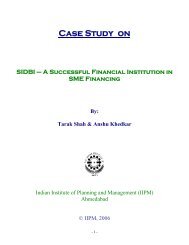
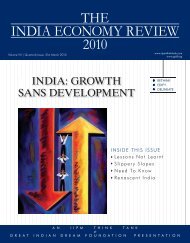
![[Feb 2008, Volume V Annual Issue] Pdf File size - The IIPM Think Tank](https://img.yumpu.com/43961117/1/190x245/feb-2008-volume-v-annual-issue-pdf-file-size-the-iipm-think-tank.jpg?quality=85)
![[June 2008, Volume V Quarterly Issue] Pdf File size - The IIPM Think ...](https://img.yumpu.com/41693247/1/190x245/june-2008-volume-v-quarterly-issue-pdf-file-size-the-iipm-think-.jpg?quality=85)

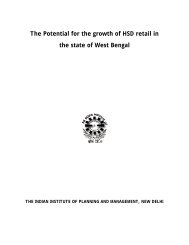
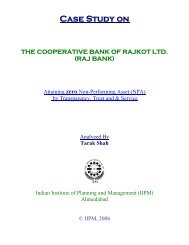


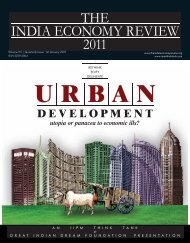
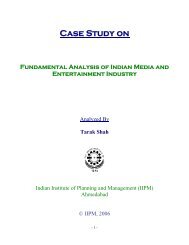
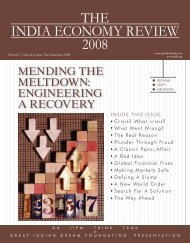
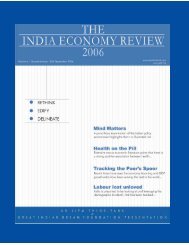
![[Volume VI | Quarterly Issue: 31st May 2009] Pdf File size](https://img.yumpu.com/27796051/1/190x245/volume-vi-quarterly-issue-31st-may-2009-pdf-file-size.jpg?quality=85)